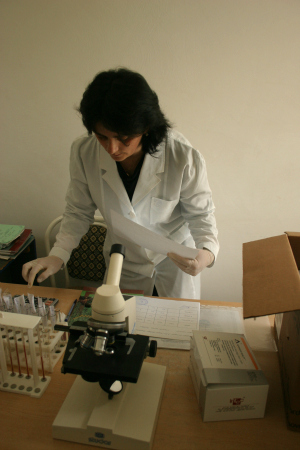RVF’s Hepatitis B screening programs benefited over 550,000 women and infants and are now being fully sustained by the local Ministries of Health. The program described below continues to be carried out without RVF’s direct involvement.
Goal: to protect newborns from acquiring chronic hepatitis B infection from their mothers through timely and aggressive medical intervention
- The entire annual cohort of pregnant women – approximately 50,000 women in Georgia, 150,000 women in Azerbaijan, and 19,000 in the city of Yerevan in Armenia – is being screened for hepatitis B carriage
- Infants born to hepatitis B carriers receive both HBIG (immunoglobulin against hepatitis B) and the hepatitis B vaccine within 12 hours of birth
- RVF trained health care workers continue to provide quality care for at-risk infants in health facilities throughout the country
 The hepatitis B virus can be passed from infected mothers to their newborns during the process of labor and delivery. Indeed, approximately 90% of chronic carriers of hepatitis B infection will transmit their infection if no preventative therapy is given laboring mothers and/or their babies. This prenatal transmission can be successfully prevented if two conditions are met: 1) Pregnant women are identified as carriers before labor has begun; 2) Appropriate therapy is begun for carrier mothers and /or their offspring.
The hepatitis B virus can be passed from infected mothers to their newborns during the process of labor and delivery. Indeed, approximately 90% of chronic carriers of hepatitis B infection will transmit their infection if no preventative therapy is given laboring mothers and/or their babies. This prenatal transmission can be successfully prevented if two conditions are met: 1) Pregnant women are identified as carriers before labor has begun; 2) Appropriate therapy is begun for carrier mothers and /or their offspring.
In October 2006, the Rostropovich-Vishnevskaya Foundation began an ambitious nationwide program in Georgia to protect the vulnerable population of neonates from the ravages of chronic hepatitis B infection. After the success of the Georgian program, the Foundation launched a hepatitis B screening program in Azerbaijan in early 2009 and in Armenia in the fall of 2009. Working collaboratively with the local ministries of health, the Foundation provided the training and materials which enabled the country’s health care workers to perform rapid diagnostic screening for hepatitis B.Women are tested at their first prenatal check-up. If rapid screening is positive, more extensive and definitive testing is performed in Reference Laboratories. This definitive testing, also funded by the Foundation, allows identification of neonates exposed to hepatitis B who will be treated with the combined preventative therapy of vaccine and specific antibody –HBIG. Transmission rates are known to fall from 90% to less than 1% for hepatitis B when the program is successfully implemented. By the time each Ministry of Health took over full responsibility for these screening programs, over 550,000 women and infants had been screened. Each annual birth cohort continues to receive this screening in Azerbaijan, Georgia and Armenia.
As with all Foundation -supported programs, the hepatitis B screening and prevention programs are being implemented entirely through the existing public health infrastructure by local health care workers, so that from the very start the ministries of health and local healthcare workers have full ownership of the programs. The programs have been fully funded by the local Ministries of Health since in 2011 in Georgia and in 2013 in Azerbaijan and Armenia. This requirement of sustainability is an inherent part of all Foundation programs.